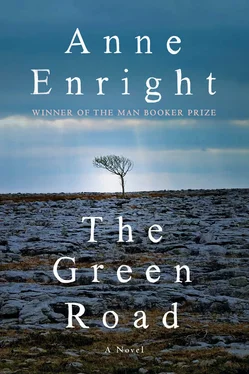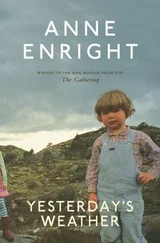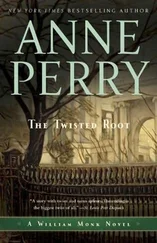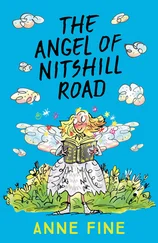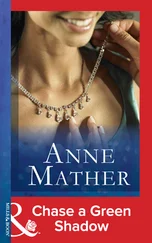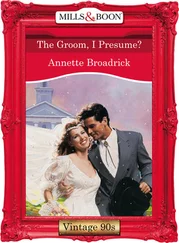She had thought there would be a path, one that wound from the school musical all the way up to the red carpet at Cannes. But there was no path. No trajectory . No career, even. There was just Theatre, darling .
She still needed it.
Thank you. Thank you. Thank you.
At the age of thirty-seven, Hanna’s dreams were rich — as was her drinking, indeed — with applause. Or booing, more often. Missed cues, lost props, stage fright. Hanna was wearing a pyjama top with a crinoline, she was in the wrong play and even in the right play, she had forgotten to learn her lines. That evening, with Hugh blank-eyed, slumped on the sofa, she pawed her way along the living room wall. She pushed her cheek against it and dragged her face along, not sure who she was playing this time. Some madwoman. Ophelia, undone.
Undone.
‘Terrific,’ said Hugh, who hated her and slept with her anyway, even that evening, with the smear of her spit drying on the wall downstairs.
Or loved her. Because he said that he loved her. It came out of him while he was fucking her.
I love, I lov, I luh.
The next morning, Hanna packed to go down home. She stood in front of the wardrobe and went through the hangers, trying to figure out what to bring. Her mother hated her in black, and Hanna had nothing but black to wear. She thought a few scarves might break it up, or some loud beads, though she could never tie a scarf, it always looked wrong. Hanna put one top against her and then another, checking in the mirror. She caught sight of her face and thought it was possible, it was more than possible that the theatre was finished for her now. Hanna had the wrong face for a grown-up woman, even if there were parts for grown-up women. The detective inspector. The mistress. No, Hanna had a girlfriend face, pretty, winsome and sad. And she was thirty-seven.
She had run out of time.
She dumped both tops in the suitcase, and threw the hangers on the bed. Hugh was standing there, against the wall of Prussian Blue, and when the baby fought for her she took him from his father. Just for a little while. As she brought him towards her, the skin of her chest seemed to sing; a clamorous want for the baby hit her everywhere the baby would be in her arms. And then she had him, and they were calm.
‘Remember when we took him down to my mother’s,’ she said. ‘That first time? Because the stupid bitch couldn’t come up to Dublin, and “how many bedrooms did you say you had?” Remember we went down there and it was sunny all the way to the other side of Ennis, and then the heavens opened just outside Islandgar, and he liked it. The rain bucketing down, and I couldn’t see through the windscreen. He didn’t like the new car seat, or there was something wrong with him, until the rain came pelting on to the roof. You said, “Pull over, pull over!” and I said I couldn’t pull over because I couldn’t see where I was going in all the rain, there was just two inches of clear windscreen, after the wiper blade, this little slice, and even that just showed you more rain. The noise of it. And inside the car so silent, and I was still driving. I said, “It’s like a dream.” Remember?’
‘Yeah,’ said Hugh. ‘Maybe.’
‘I left myself, really slowly. It happens, sometimes. I do that. But this time it was really slow. It was so slow, it was like I caught myself leaving. I mean that was the first time.’
‘Right,’ he said.
‘And I loved that. I just loved it. Going down to my mother’s with the baby in the back. And all the rain.’
IN THE ARRIVALS Hall at Shannon the glass doors pulled open and the glass door slipped shut.
Constance watched as one after another passenger was ambushed and claimed. People were crying and laughing and Constance couldn’t remember what she was looking out for, exactly. There would be some unchangeable thing about her brother to say he was her brother. Some glow. That is how she remembered Dan as a child and also, more surprisingly, from the last time they met — it must have been 2000 — a year when Constance no longer recognised her own reflection coming at her from a shop window and Dan was looking better than ever. She did not know how he managed it. Constance actually thought there might be make-up involved; or Botox, perhaps. It was as though the light had a choice, and it still chose him.
Maybe he was just fit. Though Dan never showed the effort of being fit, or unfit, she could not imagine him breaking a sweat. Handsome people did not move their faces much, that was part of the trick; her mother had it, and Dan had it too. It was the attitude, more than the fact of good looks. A sense of expectation.
Hanna was actually the prettiest of the Madigans but Hanna was all expression, all personality, and she did not photograph well — this, in an actress, was not a good thing. Constance gripped the steel rail in the Arrivals area and held her own face up like a plate for her brother to recognise, but it was, she knew, just a sad reflection of what she used to be. Her face was a shadow passing over the front of her head — like the play of light on the side of a mountain, maybe. For two seconds at a time, the old Constance was there. She inhabited the picture of herself. Everything fit.
And there was Dan — she knew him immediately — slight and alert behind his massive trolley: older than Dan should be, but looking absurdly young for his age. A gay man, as anyone might be able to discern. He checked the faces in the welcoming crowd with a nervous impeccability.
‘Hell-oooo!’ Dan threw out his hands, towards her, and stepped out from behind his luggage. More camp than she remembered. Every time a little more. It came up through him with age.
‘Look at you!’ He touched her lightly on the side of her face and then her shoulder, then leaned in, as though impulsively, for a hug. He greeted her like a friend and not a brother. He greeted her like no friend she ever had.
And he had too many bags with him. Far too many. Much of the luggage was matching. Dan noticed her noticing all this, as they walked across the concourse. They were fighting, before Constance had opened her mouth. They were doing it all over again. And Constance was utterly fed up with herself, suddenly.
I don’t care!!! she wanted to say. I don’t care who you sleep with or what you do!
Even though she did care. She checked the eyes of everyone who looked at him from the oncoming crowd.
‘How are you?’ she said to Dan.
‘Good.’
‘That overnight thing is a killer.’
Dan went to say something, but decided against it.
‘I slept,’ he said.
They were out through the main doors and in the fresh air; the beginnings of dawn to the east of them, and the lights of the airport trembling orange against the freshly blank sky.
‘Hello Ireland,’ said Dan.
He smiled, and she looked over to him. And there he was.
Dan was a year younger than Constance, fifteen months. His growing up struck her as daft, in a way. So she was not bothered by her brother’s gayness — except, perhaps, in a social sense — because she had not believed in his straightness, either. In the place where Constance loved Dan, he was eight years old.
He stood beside her as she sorted out the ticket, then they walked across the car park together, almost amused.
This was the boy who ran alongside her in her dreams. Constance, asleep, never saw his face exactly, but it was Dan, of course it was, and they were on the beach in Lahinch coming round a headland to find something unexpected. And the thing they found was the river Inagh as it ran across the sands into the sea. Sweet water into salt. Constance had been there many times as an adult, and the mystery of it remained for her. Rainwater into seawater, you could taste where they met and mingled, and no way to tell if all this was good or bad, this turbulence, if it was corruption or return.
Читать дальше
